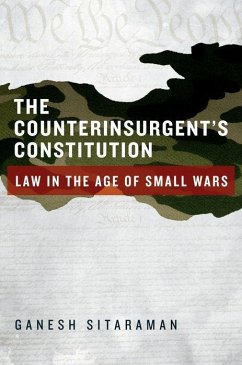Since the "surge" in Iraq in 2006, counterinsurgency effectively became America's dominant approach for fighting wars. Yet many of the major controversies and debates surrounding counterinsurgency have turned not on military questions but on legal ones: Who can the military attack with drones? Is the occupation of Iraq legitimate? What tradeoffs should the military make between self-protection and civilian casualties? What is the right framework for negotiating with the Taliban? How can we build the rule of law in Afghanistan? The Counterinsurgent's Constitution tackles this wide range of legal issues from the vantage point of counterinsurgency strategy. Ganesh Sitaraman explains why law matters in counterinsurgency: how it operates on the ground and how law and counterinsurgency strategy can be better integrated. Counterinsurgency, Sitaraman notes, focuses on winning over the population, providing essential services, building political and legal institutions, and fostering economic development. So, unlike in conventional war, where law places humanitarian restraints on combat, law and counterinsurgency are well aligned and reinforce one another. Indeed, following the law and building the rule of law is not just the right thing to do, it is strategically beneficial. Moreover, reconciliation with enemies can both help to end the conflict and preserve the possibility of justice for war crimes. Following the rule of law is an important element of success. The first book on law and counterinsurgency strategy, The Counterinsurgent's Constitution seamlessly integrates law and military strategy to illuminate some of the most pressing issues in warfare and the transition from war to peace. Its lessons also apply to conflicts in Libya and other hot-spots in the Middle East.
When the U.S. military began its "surge " in Iraq in 2006, counterinsurgency effectively became its dominant approach for fighting wars. Yet many of the major controversies and debates surrounding counterinsurgency operations have turned not on military questions but on legal ones: Who can the U.S. military attack with drones? Is the occupation of Iraq legitimate? What tradeoffs should the military make between self-protection and civilian casualties? What is the right framework for negotiating with the Taliban? How can we build the rule of law in Afghanistan? The Counterinsurgent's Constitution tackles this wide range of legal issues from the vantage point of counterinsurgency strategy. It explains why law matters in counterinsurgency, how law operates during counterinsurgency, and how law and counterinsurgency strategy can be better integrated. As Ganesh Sitaraman shows, far from being opposed, law and strategy are aligned and reinforcing. Following the laws of war is not just the right thing to do, it is strategically beneficial. Reconciliation with enemies can both end the conflict and preserve the possibility of justice for war crimes. Building the rule of law is not simply altruistic "nation-building, " but an important strategy for success. The first book on law and counterinsurgency strategy, The Counterinsurgent's Constitution seamlessly integrates law and military strategy to illuminate some of the most pressing issues in warfare and the transition from war to peace.
Hinweis: Dieser Artikel kann nur an eine deutsche Lieferadresse ausgeliefert werden.
When the U.S. military began its "surge " in Iraq in 2006, counterinsurgency effectively became its dominant approach for fighting wars. Yet many of the major controversies and debates surrounding counterinsurgency operations have turned not on military questions but on legal ones: Who can the U.S. military attack with drones? Is the occupation of Iraq legitimate? What tradeoffs should the military make between self-protection and civilian casualties? What is the right framework for negotiating with the Taliban? How can we build the rule of law in Afghanistan? The Counterinsurgent's Constitution tackles this wide range of legal issues from the vantage point of counterinsurgency strategy. It explains why law matters in counterinsurgency, how law operates during counterinsurgency, and how law and counterinsurgency strategy can be better integrated. As Ganesh Sitaraman shows, far from being opposed, law and strategy are aligned and reinforcing. Following the laws of war is not just the right thing to do, it is strategically beneficial. Reconciliation with enemies can both end the conflict and preserve the possibility of justice for war crimes. Building the rule of law is not simply altruistic "nation-building, " but an important strategy for success. The first book on law and counterinsurgency strategy, The Counterinsurgent's Constitution seamlessly integrates law and military strategy to illuminate some of the most pressing issues in warfare and the transition from war to peace.
Hinweis: Dieser Artikel kann nur an eine deutsche Lieferadresse ausgeliefert werden.







